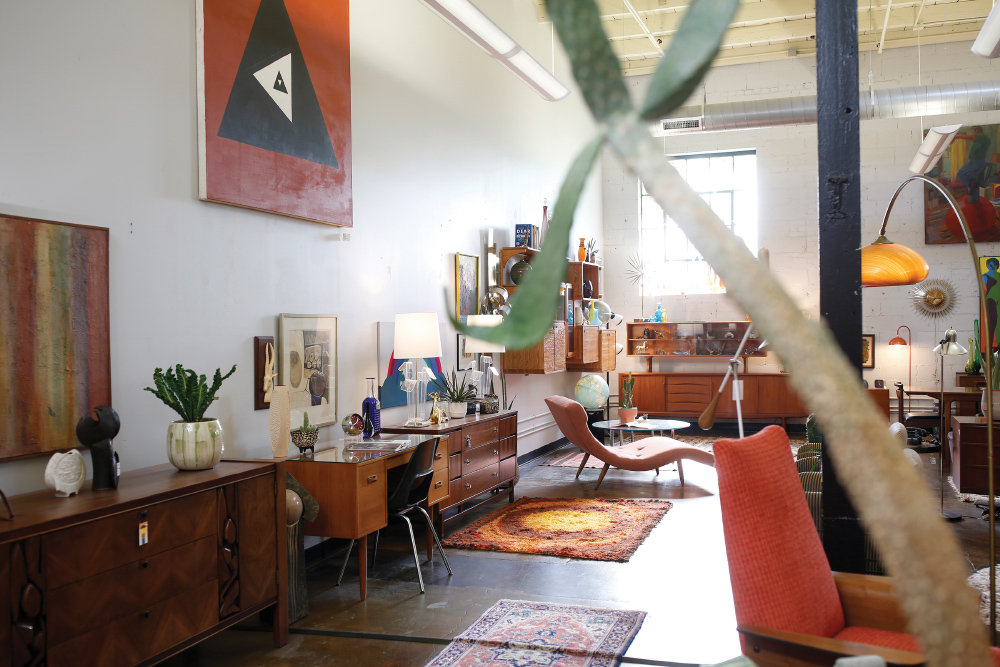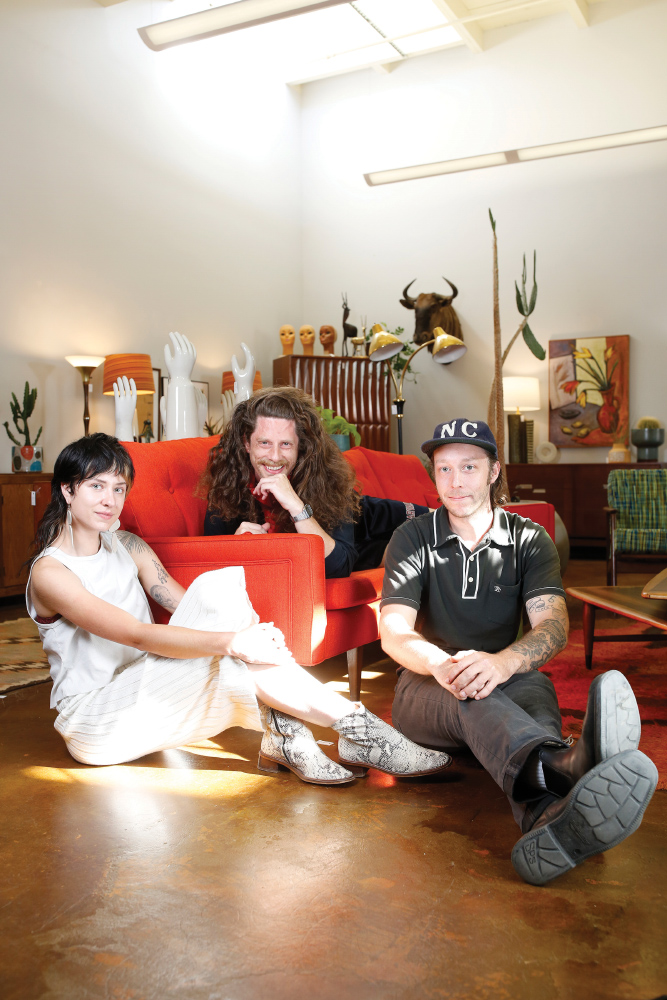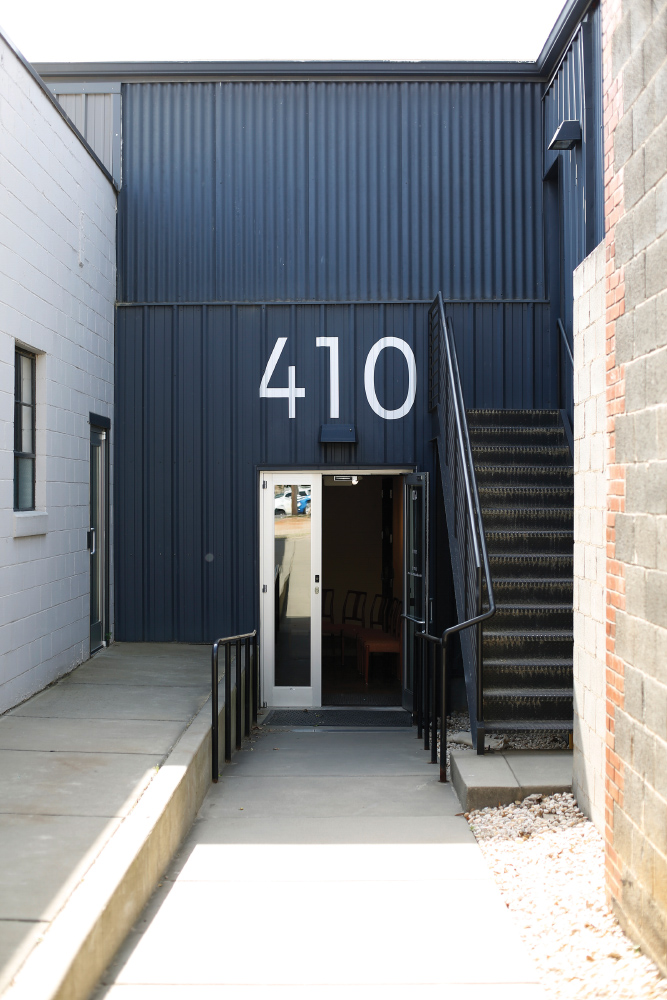Charlie Keeling and Keely Beal joined up with Christine Riker and Matt Williams to start their vintage furniture store on Dawson Street
by Finn Cohen photography by Eamon Queeney
Charlie Keeling and Keely Beal have long been familiar faces in downtown Raleigh: Keeling behind the bar at Kings for the last few years, Beal working as a server and barista at Fiction Kitchen, Humble Pie, and Morning Times. And in March of 2020, the couple took their first vacation since they joined the service industry — sort of.
They’d bonded a few years earlier over their love of vintage furniture and design. “When we first started dating, actually, a lot of our dates would involve going out to a flea market or antique malls, or going around and looking at Mid-century neighborhoods,” says Beal. “It’s something that we’ve always connected on.” As their relationship developed, so did their side hustle. On days off, or before shifts, they’d drive all over the state — or up and down the East Coast — picking out Mid-century modern rugs, credenzas, and chairs. “You never know what you’re going to find, which is exciting,” says Beal.
As their collections expanded out of a living space and into a storage unit, they started selling their finds on Instagram with the handle Keel & Company, a nod to the shared part of their names. So the vacation they’d planned to Nashville was both a break from pouring drinks and a shopping trip for their budding business.
But nature had other plans.
“A tornado hit when we were there, and then the first case of Covid appeared in Wake County,” says Keeling. “We came back to no jobs.”
The abrupt shutdown forced the couple to reassess their careers. Pre-pandemic, Keel & Company had been doing increasingly steady business — Keeling was even making enough rug sales to attract the attention of some serious Persian collectors. With nothing more to lose, they decided to take the plunge and turn their side business into a seven-day-a-week endeavor.
“We just quickly realized that nothing’s for certain, and if we were going to do it, we should do it when we had the most time,” says Beal, who was also juggling a full-time undergraduate degree at North Carolina State University in communications (she graduated during the pandemic). “Charlie and I work really great together. It’s a little less scary when you have someone there who is going through the same motions as you.”
The two reached out to another team of dealers, Christine Riker and Matt Williams of Aisle3Modern, who had been operating out of the Cheshire Cat Antique Gallery in the Village District. Riker and Williams had been working their way up over three years into three different booths at Cheshire Cat — they were hungry for more space to grow the business and knew Keeling as someone with complementary tastes.
“We’d met them on multiple occasions — you’re acutely aware of the other dealers because you go after the same pieces,” says Riker. “It was a pipe dream for both Charlie and Keely, and for us, to develop our own store.”
Together, the four found a space in a building on South Dawson Street and opened Modern Prolific, a 1,700-square-foot showroom and storefront. It has huge ceilings, tons of light, and plenty of room for staging. There are wicker and steel chairs matched with a glass table; Broyhill Brasilia credenzas with ornate drawer pulls; a lamp made from copper rods bent into abstract shapes; a hand-reupholstered, salmon-colored chaise lounge; and glass sculptures set against matching, brightly colored wall art.
Inside Modern Prolific, a waist-high, late-1970s brass-and-marble sculpture on the floor is listed for $695 — but the same piece on an auction website is nearly $3,000. “The hardest part about this job is pricing,” says Keeling. “I’m not trying to get rich, I’m trying to put cool stuff in people’s homes. Six, seven hundred dollars is a lot for a sculpture — but if I was in New York or L.A., it would be many times that.”
As the market for Mid-century goods has expanded over the past couple decades, the pool of items has shrunk, giving way to the old law of supply and demand. “It’s surprised everybody that’s been doing this for a very long time how quickly it has changed, and how much more expensive it has become to procure the items that we sell,” says Riker. “We’ll go to auctions with companies that have been selling us goods for decades — they’ll make jokes and say, 10 or 15 years ago, we couldn’t give this stuff away!”
These days, Williams and Riker travel nearly every week to find new pieces, from the Deep South up to the Canadian border, with the same picker mentality as the brand’s origins. These road trips are a tricky calculus of time, distance, and investment. “Every time we buy something, we’re trying to figure out whether or not we can make money,” says Riker. “You can’t drive 700 miles and spend the money on fuel and accommodations and everything else if it won’t sell for enough to cover your expenses.”
But that balancing act underscores another old law: the one about risk and reward. There’s no telling what’s under the rocks that no one’s bothered to look at yet.
“It was a huge gamble,” says Keeling. But the gamble, Beal says, is worth it: “To find these pieces that are so special that are just sitting somewhere getting damaged, in someone’s basement no longer being appreciated — it’s amazing to be able to do that.”
This story originally appeared in our August 2021 issue.




